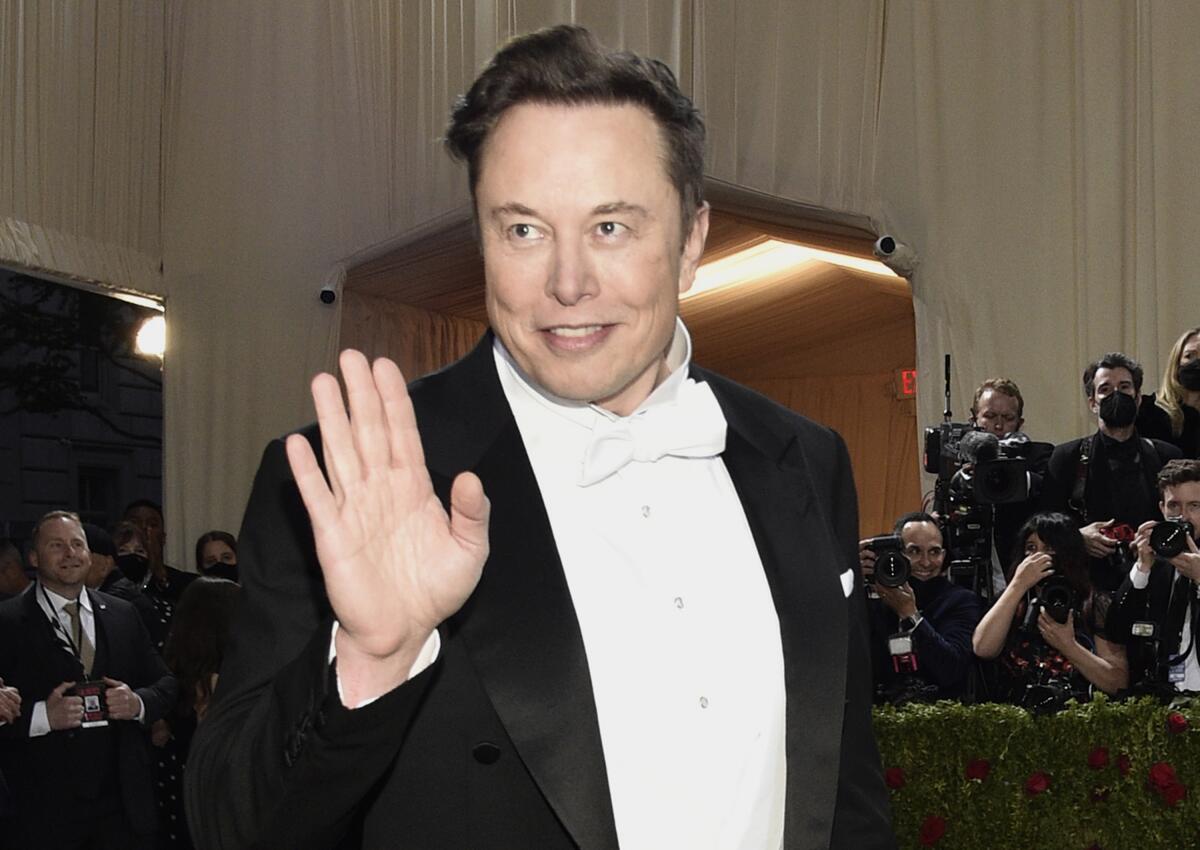Elon Musk says he would reverse Twitter’s ban of former President Trump

Elon Musk said he would allow President Trump to return to Twitter if the Tesla chief executive takes ownership of the company, reversing the former president’s January 2021 suspension over his incendiary tweets surrounding the Jan. 6 attack on the U.S. Capitol.
During a virtual appearance at the Financial Times Future of the Car conference on Tuesday, Musk said “a temporary suspension is appropriate, but not a permanent ban.” He added that the decision to suspend Trump was “morally wrong” and led to conservatives moving to more insular spaces.
“Banning Trump from Twitter didn’t end Trump’s voice; it will amplify it among the right,” he said.
Twitter declined to comment on Musk’s statement, including whether the company’s current leadership has plans to ratify Musk’s decision or preemptively counteract it.
Musk’s comments come as Twitter users have expressed concerns that Musk, who is seeking to buy the company for $44 billion, would view some content moderation efforts aimed at keeping harmful content off the platform as censorship. Allowing Trump to return to the platform would dovetail with Musk’s ongoing criticism of how the app approaches free speech.
Two days after the Capitol attack, Twitter announced it would permanently suspend Trump “due to the risk of further incitement of violence.” Since being banned, Trump has used news releases and rally appearances to communicate to his supporters, often repeating the false and unfounded claim that there was widespread voter fraud during the 2020 election.
Trump told Fox News late last month that he would not rejoin Twitter if given the chance, but would continue boosting Truth Social, the so-called free-speech-focused Twitter competitor that Trump launched after he was banned across various social media platforms. The app has struggled with technical problems, an atrophying user base and high-level resignations — Trump‘s use of the site appears to be far less frequent than his Twitter use had been.
Other apps that at one point seemed primed to peel a sizable conservative user base off Twitter — such as Parler and Gab — have similarly failed to go mainstream.
But the implications aren’t restricted to Twitter. The platform has historically served as something of a social media weather vane, indicating the directions in which the industry is headed. Its content moderation decisions have often preceded similar calls by Facebook.
While Twitter permanently banned Trump within two days of the Jan. 6 insurrection, Facebook moved to suspend Trump’s account indefinitely, punting the specifics of that timeline to the company’s third-party oversight board — which in turn sent the decision right back to Facebook. Forced to make the call itself, Facebook extended the former president’s ban until Jan. 7, 2023.
If Musk reverses the Twitter ban, it could provide cover, or create pressure, for Facebook to do the same thing. Representatives for Facebook — whose parent company was recently renamed Meta Platforms — did not say if or how a reversal of Trump’s Twitter ban would affect the former president’s parallel ban from its platform, but pointed The Times to mid-2021 statements from the Oversight Board and Facebook that established Trump’s two-year ban.
If Trump were to rejoin Twitter, it’s unclear that returning to the platform would help him or the Republican Party.
For four years, Trump’s Twitter feed offered real-time narration of his presidency, with missives that would commandeer the daily news cycle. But despite his vast reach — the account had roughly 88 million followers by the time it was banned — it wasn’t necessarily a hit with voters.
A 2017 Wall Street Journal/NBC news poll found that two-thirds of Americans disapproved of Trump’s Twitter presence. And in February 2020, a survey by the Economist/YouGov found a majority of voters said Trump’s Twitter was inappropriate, and 65% said he tweeted too frequently.
“I think there’s a lot of people in his world that would encourage him not to go on Twitter,” said Rob Stutzman, a California-based Republican strategist who has been critical of Trump.
Trump’s Twitter presence could also have a damaging effect on GOP midterm campaigns. Republicans are hoping their messaging on inflation, gas prices, crime and immigration will help them flip one or both chambers of Congress, where Democrats hold razor-thin majorities.
Though Trump’s endorsement has helped candidates in crowded Republican primaries, most recently Ohio Senate primary winner J.D. Vance, his tweets historically dominated the news cycle at the party’s expense.
“Kevin McCarthy and Mitch McConnell I don’t think are at all enthusiastic about this election being a referendum on Donald Trump,” said Kurt Bardella, a former GOP communications expert who now consults for the Democratic National Committee and Democratic Congressional Campaign Committee, referring to the Republican minority leaders in the House and Senate.
After Republican Glenn Youngkin won the Virginia governor’s race in 2021, Bardella said, “there was a lot of talk on both sides of the spectrum about how Youngkin was able to run a ‘keep Trump at arms length’ campaign.” That blueprint would be much harder for other Republicans to follow with Trump regaining his social media megaphone.
“He makes everything ultimately about himself,” Bardella said. “If he is able to rejoin Twitter, every candidate running on the Republican slate is going to have to answer for how the head of their party reacts to things. They won’t be able to avoid it.”
But Trump’s allies, many of whom have criticized what they see as anti-conservative bias in the way the platform moderates content, cheered the news that Musk would allow Trump to return.
“Twitter’s days of canceling conservatives are done,” tweeted Brent Bozell, the founder of the Media Research Center, a conservative watchdog group.
More to Read
Get the L.A. Times Politics newsletter
Deeply reported insights into legislation, politics and policy from Sacramento, Washington and beyond. In your inbox three times per week.
You may occasionally receive promotional content from the Los Angeles Times.













